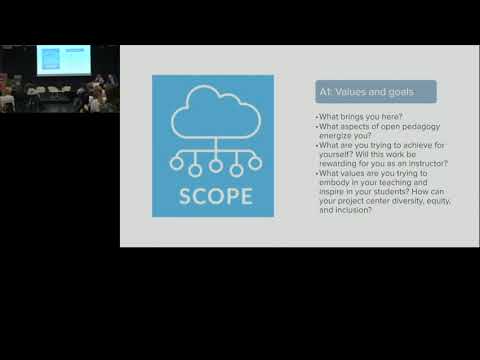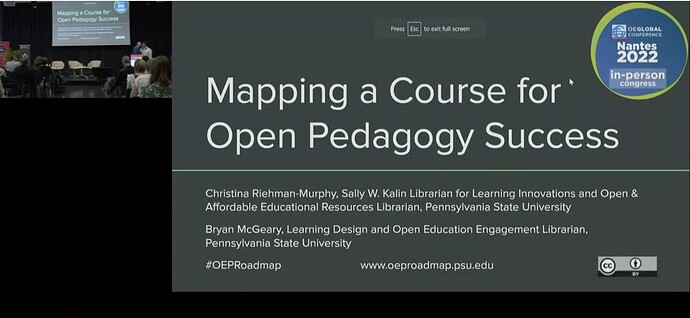Open pedagogy can be an exciting way to reinvent the learning experience; however, making the shift can seem daunting at first. Because an open pedagogy project’s scope typically looks beyond the confines of a traditional classroom learning space, these projects are multi-faceted and require a project management plan to be sustainable. In this session we will discuss the Open Pedagogy Project Roadmap, an openly licensed, step-by-step, module-based, discipline-agnostic project management guide for instructors to think through the process of scoping, implementing, sustaining, and sharing their own open pedagogy projects regardless of its size or scope (Riehman-Murphy and McGeary, 2021). The four modules of The Roadmap guide faculty through the 5 Ss of open pedagogy projects: Scope, Support, Students, Sharing, and Sustaining.
Open Pedagogy projects invite students to be collaborators, contributors, and creators who shape public knowledge. They are designed with the intention of sharing them openly with future publics — be that with future students, or out on the web — to be reused, revised, or remixed. Open pedagogy projects also invite students into a different relationship with instructors and with knowledge. They invite students to be collaborators and creators instead of learners and consumers. Thus, there are additional considerations for both instructors and students alike. While there are case studies detailing open pedagogy projects and useful handbooks to guide faculty who are interested in exploring open pedagogy projects (Clifton and Hoffman, 2020), a review of the literature revealed that there was a space for this type of practical open pedagogy project management guidance. Drawing from our collective experiences and the literature, 5 Ss of open pedagogy projects emerged as essential tenets to consider when planning for and sustaining one.
Developed by two academic librarians, the Roadmap walks instructors through a process of identifying core elements of their project in order to create a customized, sustainable, and actionable implementation plan, work that is critical to success but is often set aside in the interest of time. The Roadmap asks instructors to consider the values they bring to their project, the collaborations that may be involved beyond the classroom (e.g., librarians, instructional designers), the resources they will need, and their plans for sharing and sustaining the project. The Roadmap also encourages them to consider issues like student agency, assessment, and the role of open pedagogy in fostering diversity, equity, inclusion, and accessibility.
In this thematic session, we will discuss as our experiences as librarians with supporting the creation and dissemination of two open pedagogy projects and how this work informed the creation of the Roadmap.
Info
![]() Presented by:: Christina Riehman-Murphy, Bryan McGeary
Presented by:: Christina Riehman-Murphy, Bryan McGeary
![]() Conference Track: Thematic Session: Libraries and librarians
Conference Track: Thematic Session: Libraries and librarians
![]() Track Date/Time: 2022-05-23T14:20:00Z (your local time)
Track Date/Time: 2022-05-23T14:20:00Z (your local time)
![]() Language: English
Language: English
![]() Pretalx link: Mapping a Course for Open Pedagogy Success :: Open Education Global 2022 :: pretalx
Pretalx link: Mapping a Course for Open Pedagogy Success :: Open Education Global 2022 :: pretalx
Watch Recording
Participate
Authors are asked to reply below with links to presentation materials, videos, and other relevant resources, as well as posting prompts for discussion.
Conference participants can reply below with questions, comments for the presenters or to share related resources. And please add anything relevant from this session as an annotation to a specific part of the UNESCO OER Recommendation.

